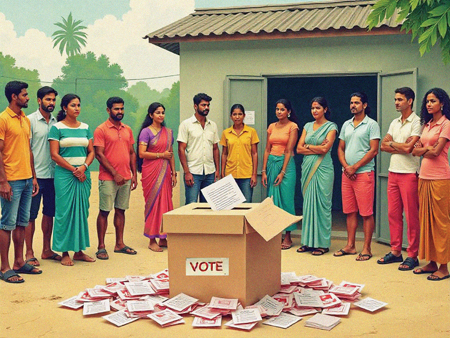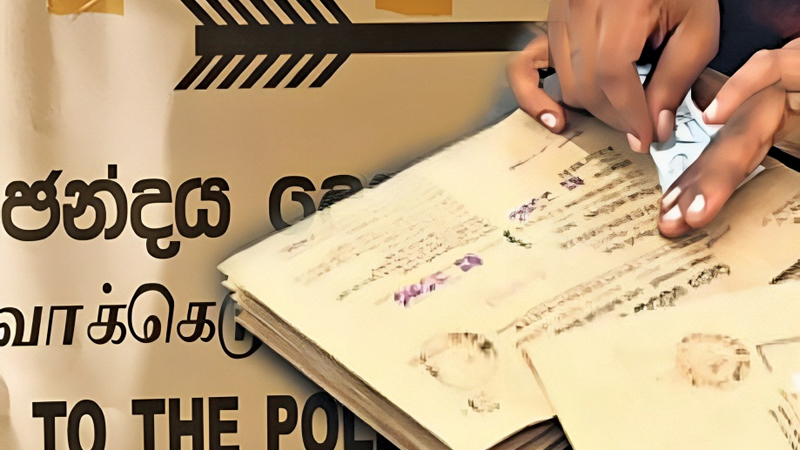 Sri Lanka is getting ready for another crucial election on May 6, 2025. As the nation prepares to head to the polls once again, a concerning trend from previous elections demands attention to the high number of rejected votes and voter abstention.
Sri Lanka is getting ready for another crucial election on May 6, 2025. As the nation prepares to head to the polls once again, a concerning trend from previous elections demands attention to the high number of rejected votes and voter abstention.
In the 2024 Presidential Election, while 97.8% of the cast votes were valid, a significant 300,300 ballots were rejected. Even more striking, over 3.5 million registered voters did not participate in the electoral process. The 2025 General Election saw an even steeper decline in voter turnout, with nearly 5.3 million registered voters choosing not to vote and a staggering 667,240 ballots being deemed invalid.
These numbers raise pressing questions. Why are so many people staying away from the ballot box? What factors are contributing to the increasing number of rejected votes? And most importantly, what can be done to ensure a more inclusive and participatory electoral process?
Through discussions with civil society members, political representatives, journalists, and voters across Sri Lanka, this article delves into the root causes of voter exclusion and ballot rejection, seeking answers to strengthen the democratic process and encourage meaningful voter participation.
Addressing the disenfranchisement of eligible prisoners in Sri Lanka
In comprehensive discussions held across Sri Lanka led by the Center for Monitoring Election Violence – CMEV research, participants from various sectors, including civil society members, political party representatives, journalists, and concerned citizens, have consistently highlighted the issue of certain groups being denied the opportunity to vote during elections. A particularly notable group facing such disenfranchisement is that of remand prisoners. This concern was especially emphasized in districts such as Anuradhapura, Monaragala, and Ratnapura.
According to Article 89(d) of the Sri Lankan Constitution, individuals convicted of serious offenses, such as those serving sentences exceeding two years or facing death penalties, are restricted from voting. However, this restriction does not apply to remand prisoners (pre-trial detainees) and those serving sentences for minor offenses; these individuals retain their constitutional right to vote. Despite this entitlement, the absence of a practical voting mechanism has systematically disenfranchised thousands of eligible prisoners.
As of May 2024, Sri Lanka’s prisons housed 19,867 remand prisoners, accounting for 64.7% of the total prison population. These individuals, presumed innocent under the law, are unable to exercise their voting rights due to logistical and procedural challenges.
The Election Commission and the Human Rights Commission of Sri Lanka have acknowledged this issue, proposing solutions such as advance voting or the establishment of polling stations within prison facilities. However, legislative inertia and political reluctance have hindered the implementation of these measures.
The urgency of addressing this disenfranchisement was underscored during the 2020 General Election, where over 20,000 eligible voters in prisons were barred from participating. This situation highlights the need for institutional reforms to uphold democratic inclusivity.
Project Officer of the Committee for Protecting the Rights of Prisoners (CPRP), Rasika Gunawardena shed light on the challenges faced in ensuring voting rights for prisoners:
“Civil societies are continuously discussing this issue with the Election Commission. The Commission’s stance is that not only prisoners but all those who are excluded from the electoral process should be given the right to vote. However, the real problem here is not the law but the social stigma. Many ordinary people, and especially government officials, believe that prisoners do not have the right to vote because they are criminals and have no place in society. Unfortunately, even the Prisons Department of Sri Lanka held this view. It was only after explaining the legal provisions that they understood otherwise. Therefore, the main obstacle is not the law, but the social stigma”.
Addressing the disenfranchisement of eligible prisoners is crucial for strengthening Sri Lanka’s democratic processes.
Additional groups disenfranchised on election day
Discussions across various districts in Sri Lanka have revealed that several societal groups face challenges in exercising their voting rights on election day. Notable among these are healthcare workers, hospitalized patients, private security personnel, supermarket employees, Sri Lankans abroad, and individuals engaged in specific occupations such as long-haul transportation, fishing, plantation work, and gem mining.
 In districts like Polonnaruwa, concerns were raised about patients admitted to the National Nephrology Hospital, many from other regions, who undergo prolonged treatments during election periods. Similarly, healthcare professionals working extended shifts find it challenging to leave their duties to vote, leading to their disenfranchisement.
In districts like Polonnaruwa, concerns were raised about patients admitted to the National Nephrology Hospital, many from other regions, who undergo prolonged treatments during election periods. Similarly, healthcare professionals working extended shifts find it challenging to leave their duties to vote, leading to their disenfranchisement.
Polonnaruwa, renowned for its rice production, sees hundreds of vehicles distributing rice nationwide daily. Drivers and assistants operating these lorries are often on the road during elections, preventing them from voting. Additionally, bus drivers and conductors traveling from Polonnaruwa and Kaduruwela to distant areas such as Colombo and Kandy face similar challenges, with limited attention given to their voting rights.
Coastal discussions highlighted that fishermen at sea on Election Day are unable to vote. In Hambantota, many boats embark on multi-day fishing trips, leading to voter apathy within the fishing community. Some fishermen question the value of voting, citing unresolved industry issues, which contributes to significant vote wastage in these regions.
In areas like Kandy, Matale, and Badulla, the Malaiyaha community faces obstacles to voting. Election observers from Matale noted that inadequate transportation prevents some from reaching polling centers. A civil society activist from Badulla highlighted that plantation workers receive a half-day holiday starting at 2 p.m. on Election Day. After weighing their harvested tea leaves, a process that can extend beyond an hour—they often find polling stations closed upon arrival, resulting in numerous uncast votes.
More affected groups
Farmers in Anuradhapura reported that Election Day often coincides with the harvest season. Leaving paddy fields unattended risks damage from wild elephants and other animals. Given the potential loss of their hard work, many prioritise field protection over voting, expressing skepticism about political support for their concerns.
Similarly, in Moneragala, farmers practicing chena cultivation refrain from voting to safeguard their crops. Living below the poverty line and focused on subsistence, their engagement in political processes remains minimal.
Discussions in Ratnapura and Badulla revealed that gem mining employees, often from other districts, are unable to vote due to their work commitments away from home.
Election observers also raised concerns about private vehicle drivers engaged in election duties who cannot vote. Police officers acknowledged this issue, noting that private vehicles are commonly used for transporting ballot boxes and monitoring during elections.
During the last parliamentary elections in Anuradhapura, numerous private vehicles were deployed for election duties. Drivers, some participating for the fifth consecutive time, expressed pride in their role but regretted their inability to vote.
Anuradhapura District Assistant Election Commissioner K. Mukunthan addressed this concern, stating that postal voting is available for these drivers.
However, awareness about this provision is lacking, and last-minute vehicle enlistments complicate the process. These logistical challenges hinder the effective facilitation of voting rights for private vehicle drivers on election duty.
Furthermore, there was a discussion about some groups that are abstaining from voting due to the electoral system in Sri Lanka. Caste differences are still prevalent in some areas of Sri Lanka, especially. Often, it is possible to identify which caste a person belongs to through their names. Generally, in Sri Lanka, the voter’s name is called out loud at polling stations. This is why the caste identity of some people is revealed. The fact that people from some castes do not vote due to their identity being revealed in this way was discussed during our discussions in the Kandy and Matale areas. Similarly, it was discussed that some Plantation community Tamil women do not come to vote because they feel embarrassed when Sinhala Election officials pronounce their Tamil names incorrectly.
Electoral inclusivity
To address the challenges of disenfranchisement among various societal groups, insights were sought from election specialist and lawyer, Dissanayake Dasanayaka, and international election observer, Senior Program Officer at the Asian Network for Free Elections (ANFREL), Tharindu Damith Abeyrathna.
Dissanayaka emphasized the need to modernise Sri Lanka’s electoral processes, moving away from outdated colonial practices. He highlighted the practice of loudly announcing voters’ names at polling stations as an example of an antiquated method that could be revised to enhance voter privacy and prevent potential intimidation.
He further advocated for the introduction of advance voting as a means to enfranchise groups unable to vote on Election Day, noting its successful implementation in numerous countries. Dissanayaka also underscored the importance of comprehensive voter education to reduce invalid ballots and increase awareness of the significance of each vote. Simplifying the voting process and creating a more welcoming environment at polling stations were also suggested to alleviate voter apprehension.
Abeyrathna, drawing from international experience, elaborated on various advance voting mechanisms employed globally. He cited South Korea’s practice of opening select polling stations for advance voting in the week preceding Election Day, which accounted for approximately 30% of the votes cast in recent elections. In Myanmar, township election offices remain open for about a week before elections, allowing voters to cast their ballots in advance. Additionally, countries such as Indonesia and Myanmar utilize mobile voting systems, where ballot boxes are brought to individuals unable to reach polling stations due to age or disability.
Abeyrathna also highlighted that in Timor-Leste, hospitalised patients are permitted to vote at nearby polling stations, with some hospitals even housing dedicated polling stations. Prisoners in countries such as the Philippines, Indonesia, and Timor-Leste retain their voting rights and are facilitated to vote through in-prison polling stations or mobile voting units.
These expert perspectives underscore the potential for adopting modern electoral practices and advanced voting systems to enhance inclusivity and ensure that all eligible citizens can participate in Sri Lanka’s democratic processes.









